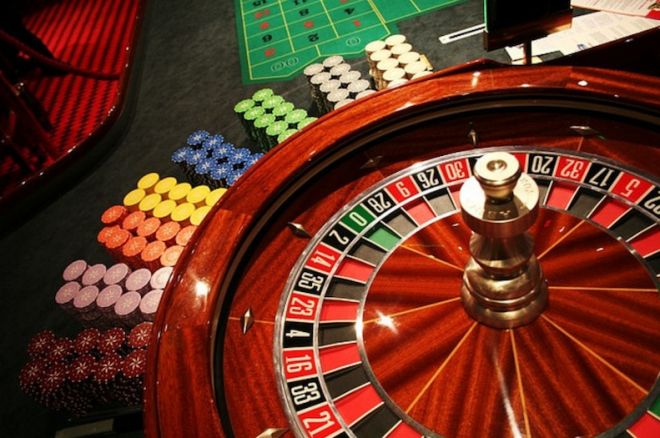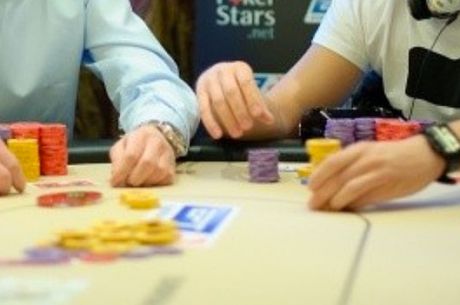What Is the ��Gambler��s Fallacy�� and How Does It Apply to Poker?

You��re walking through a casino, past the roulette wheels. As has become common in modern casinos, each wheel has a prominent electronic display board showing the results of recent spins. Glancing at these as you stroll past, you notice that one wheel has hit on a red number the last nine times in a row.
Should you:
- (A) Pull $100 out of your wallet and bet on black, because it��s clear that black is overdue to hit.
- (B) Pull $100 out of your wallet and bet on red, because it��s clear that the wheel is in the middle of a long streak of hitting red.
- (C) Keep walking, because betting on roulette carries an expectation of loss no matter what the previous several results have been.
I hope you know that the best answer is (C).
We can safely assume the wheel is fair, because casinos spend a lot of time and money to keep them that way, lest a savvy gambler detect that the wheel tends to hit on some number or cluster of numbers disproportionately, and thus have a betting situation that is favorable to him and unfavorable to the house.
Given that assumption, think what would have to be true for either (A) or (B) to be the best answers. Some person or entity would have to be assigned to keep track of every spin of every roulette wheel and to notice when streaks are developing. That person or entity would then have to decide how long to let the streak continue, and have some mechanism for controlling the wheel, to make it either continue to hit on red or terminate the sequence by making it hit on black. If casinos actually did that, and got caught at it, they would face hefty penalties from their governmental regulators.
But perhaps you��ll object that this isn��t a matter of a person or casino controlling the outcome; it��s just the unseen hand of mathematics. This is especially an argument that would be heard from a person favoring answer (A) above. The law of averages says that it��s extremely unlikely that you��d get ten reds in a row. Therefore, after nine reds, the next spin is more likely to be black, making that a good bet.
Again, though, think about how this could happen. What mechanism does the universe have that could track the results, notice that an abnormal streak is developing, and alter the physics of the ball��s tumbling such that on this one particular spin it will be more likely to fall into a black slot than a red one? Simple answer: There is none.
It is true that in any given series of ten spins, the most likely number of reds will be five. It��s a little less likely to be four or six. The most unlikely number of reds is either zero or ten.
But it��s crucial to understand that those statements are only valid descriptors of the probabilities in advance of the entire string of ten spins. Each individual spin is completely independent of the results of any other. Past spins cannot affect the outcome of the next one. Because of that, once random chance has delivered nine reds in a row, the next spin is exactly as likely to hit red as it is black.
It is a common mistake to confuse two distinct questions: ��What is the probability of getting ten reds in a future series of ten spins?�� and ��What is the probability of the next spin being red, given the fact that the last nine spins have been red?�� The answer to the former is about 0.057%. The answer to the latter is about 47%, if the wheel has both 0 and 00 slots.
This mental error is so common that it has long had a name �� ��the gambler��s fallacy.��
What does this have to do with poker, and poker strategy in particular? Well, I��m writing about the subject this week because of a conversation I had with a poker-playing friend who had fallen prey to the fallacy, though in a mild and harmless way. He said that he had been disappointed to go to a poker room that had a progressive, multi-casino bad-beat jackpot, and learn that it had hit just a few days before. He thought that made it less likely that it would hit again anytime soon.
It��s true that the size of the jackpot would be smaller, because it had not had time to build up since last being hit. But the probability of any given hand of poker resulting in a qualifying bad beat remains exactly the same �� even for the very next hand dealt after the jackpot has been claimed.
But isn��t it astronomically unlikely that it would hit on two hands in a row? Sure it is. But that is looking in advance at any future series of two hands. Once the first one hits the jackpot, the probability of it hitting on the next hand is the same as always.
That said, other factors can change the probabilities. For example, many poker rooms progressively lower the threshold for a jackpot-qualifying hand as the jackpot grows larger, so that it becomes easier to hit. Also, as news of a burgeoning jackpot spreads, more people come to the poker room hoping to win it, so more hands of poker get dealt in a given day than when the jackpot is smaller.
A savvy player might rationally decide that that��s a good time and place to put in some hours �� not just in hopes of getting a ��table share�� of the bounty, but because the extra players present are likely to be more casual, recreational players than serious regulars, so the games might become more profitable as well.
The gambler��s fallacy comes up in more mundane poker contexts, too. Some examples I��ve witnessed:
- Once at the old Las Vegas Hilton poker room, one player lost his stack to another when his KxKx was bested by AxAx. This happens all the time, but what was memorable about this instance was that the man with KxKx justified his call of his opponent��s all-in bet by saying, ��I didn��t think he had aces, because this guy [pointing to another player] just had aces on the previous hand.��
- Another time, at the Hooters poker room, one player won a huge pot when he flopped a set of eights, having called an unusually large preflop raise. As he was raking in the chips, he said, in complete seriousness, ��I normally would have folded. I only stayed in because eights have been hitting the board a lot tonight.��
- During the 2007 World Series of Poker, professional poker player Hevad Khan moved all in with Q?Q? and was called by Rami Boukai who had A?A?. Boukai apparently held KxKx just a few hands earlier, though this hand wasn��t shown on the ESPN broadcast. Khan got unbelievably lucky and flopped the other two queens to win with quads. When the hand was over, he chatted with Boukai and said, ��It��s so hard to put you on aces and kings in one orbit.�� Apparently Khan felt his queens must be good because he couldn��t believe that Boukai, having recently had kings, could have either aces or kings again so soon. This suggests that even some professional players can��t get their minds around the fact that each hand is completely independent of previous ones.
- Even Mike Sexton is vulnerable to this fallacy. In a 2008 World Poker Tour broadcast, two amateur players, Andrew Barta and Robert Richardson, were contesting a pot. Richardson was on the button and raised with J?J?. Barta was in the big blind and reraised with 7?7?. While waiting for Richardson to decide what to do, Sexton said, ��Well, Robert knows that he [Andrew] had two kings the last pot. You��re never gonna put a guy on aces, kings, and queens back to back.��
There are a few ways that you can take advantage of the fact that many poker players subscribe to the gambler��s fallacy.
If you are lucky enough to get a big pocket pair immediately after a hand in which you had another big pocket pair that was shown, realize that many opponents simply will not believe that you could have aces or kings again so soon. So play them hard and fast, because others will be likely to call you down lighter than usual.
If players have been discussing a perceived heightened frequency of some rank of card being on the board, you can use that to bluff. For example, last week in my home game, an unusual number of boards had two sixes, and everybody had noticed. I was looking for an opportunity to make a large bet or raise the next time this happened, with a comment like, ��I knew they would come again for me!�� I had hoped that others would believe that I had kept a hand like Kx6x that I would normally fold preflop. Sadly, the ��streak�� of sixes stopped before I could try it.
Even where there has not been an actual profusion of such instances, you can create the illusion of it. On a board of, say, K?J?7?3?A?, you could casually observe, ��We sure have been getting a lot of rivered aces tonight.�� Then point it out when it happens again: ��See? Aces love the river tonight!�� People will naturally start noticing it, and it will feel unusually common, even if it isn��t. Then look for an opportunity to bluff when it happens again, as if you had been counting on it. You may get more credit than you otherwise would.
But more important than exploiting other people��s belief in the gambler��s fallacy is being aware of it so that you don��t fall for it yourself, in any of its various forms and applications.
Photo: ��Roulette,�� Chris Yiu. Creative Commons Attribution ShareAlike 2.0 Generic.
Robert Woolley lives in Asheville, NC. He spent several years in Las Vegas and chronicled his life in poker on the ��Poker Grump�� blog.
Want to stay atop all the latest in the poker world? If so, make sure to get PokerNews updates on your social media outlets. Follow us on Twitter and find us on both Facebook and Google+!








